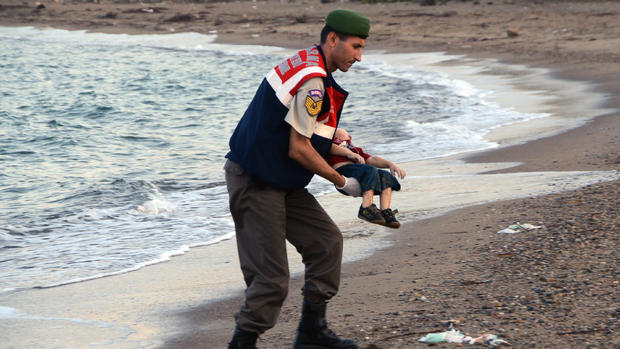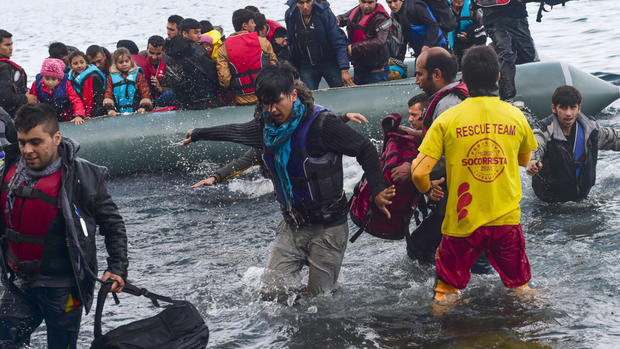Body of migrant girl, 4, washes ashore in Turkey
Authorities have recovered the body of a 4-year-girl who was among a group of 10 migrants reported missing after a boat sank on its way to Greece, Turkey's state-run news agency reports.
The Anadolu Agency says the girl's body was discovered Sunday among rocks in the resort of Bodrum.
She was identified as one of the 10 reported missing Nov. 18 by one of the five survivors, Anadolu said.
The migrant who identified her said a woman addressed the girl as "Sena" during their ill-fated journey to the Greek island of Kos, according to Anadolu.
Save the Children charity group says more than 70 children have drowned trying to reach Greece since September.
The case of a young Syrian boy found dead on a Turkish beach after drowning drew worldwide to the depth of the migrant crisis sparked by wars and the rise of the Islamic State of Iraq and Syria (ISIS) in the Mideast and elsewhere.
Vice President Joe Biden is traveling to to Croatia Wednesday for meetings with Southeast European leaders struggling to cope with the influx of migrants flooding into Europe. The worldwide movement of refugees and displaced people has sparked an intense debate in both Europe and the United States about whether to allow Syrian refugees following the ISIS attack in Paris.
Administration officials said security and humanitarian constraints are concerns for the leaders, with as many 5,000 migrants reaching Europe's shores each day.
The migrants themselves face grueling conditions that go beyond the rapid approach of winter, as many Eastern European governments have struggled to cope with the volume of people passing through.
Six Iranian migrants have sewn their mouths shut during a protest near the village of Idomeni at the Greek-Macedonia border.
They took the action Monday as several hundred migrants, many from Iran and Morocco, protested for a fourth straight day at the border.
Macedonia and other Balkan countries have toughened criteria for border crossings in the wake of the deadly Nov. 13 Paris attacks.
Police say 2,900 people crossed the border into Macedonia in the 24 hours before 6 a.m. Monday, down from more than 6,000 on the previous day.
Poland's new interior minister said Tuesday the decision by the previous government to accept 7,000 refugees was "wrong."
Mariusz Blaszczak said on state radio on Monday that the new government will make "no compromises" as far as the security of the Poles is concerned.
He did not say whether the government will reverse the decision that was part of the European Union's plan to share some 160,000 refugees who came to Italy and Greece.
The new conservative Cabinet of Prime Minister Beata Szydlo was sworn in last week.
Police in northern Germany are investigating a fire at a multi-family home housing some asylum seekers as a likely arson. Germany has seen a spike in violence against migrants since the crisis began.
Police told the dpa news agency Tuesday that the Monday night fire at the home in the town of Woldegk, about 90 miles north of Berlin, appears to have been set in the basement. Thirty-five residents, including 10 asylum seekers, were forced to leave move into temporary shelters. A 76-year-old and a 14-year-old were treated for smoke inhalation.
Police say part of their investigation is determining whether there was a "political motivation" for setting the fire.
Two cars were set ablaze in the town 10 days ago in a case that has not yet been solved.
The head of Vienna's Jewish community is expressing concern that the influx of migrants to Austria could result in a spike in anti-Semitism.
Oskar Deutsch says that among the migrants are those who have grown up on a diet of anti-Semitism. And he says Austria has now "more or less" reached its capacity as far as taking in new arrivals is concerned.
He told reporters Monday that some of those seeking asylum in Austria are only "so-called refugees," suggesting they have no reason to seek the safe haven reserved for those fleeing war and persecution.
Austria is bracing for a total of about 95,000 refugees this year, just over 1 percent of its population.
German police say 180,000 asylum seekers have entered the country so far this month, pushing the year's overall figure already well beyond the number the government's estimate for the full year.
The Bundespolizei, responsible for border security, confirmed Monday 180,000 had arrived this month, positioning November to most likely break the previous monthly high of 181,000 set in October.
Germany had reported more than 758,000 arrivals from January through October, meaning that now the country has seen more than 938,000 newcomers.
The Interior Ministry in August forecast 800,000 would arrive this year. Since then it has refused to update the figure, saying doing so could be misconstrued as an invitation.
Vice Chancellor Sigmar Gabriel has said, however, that 1 million could come and now even that seems too low.

